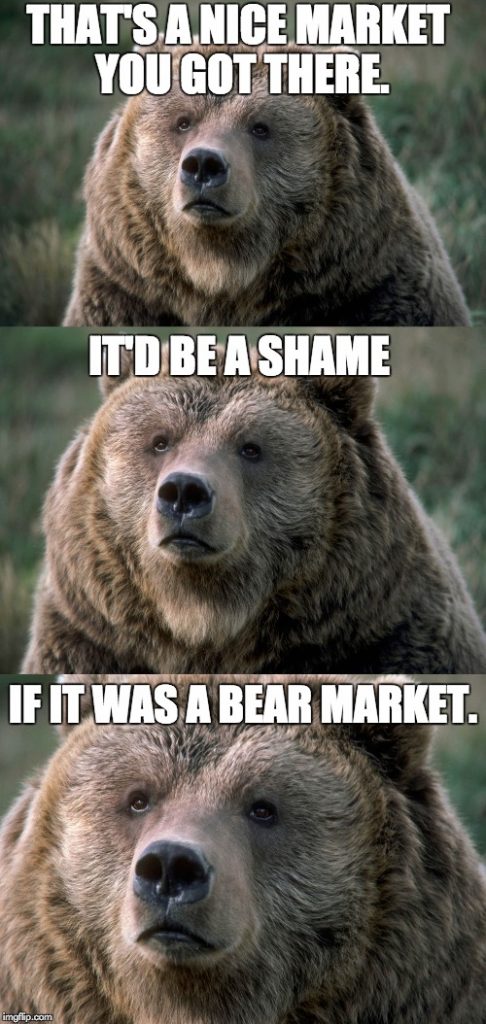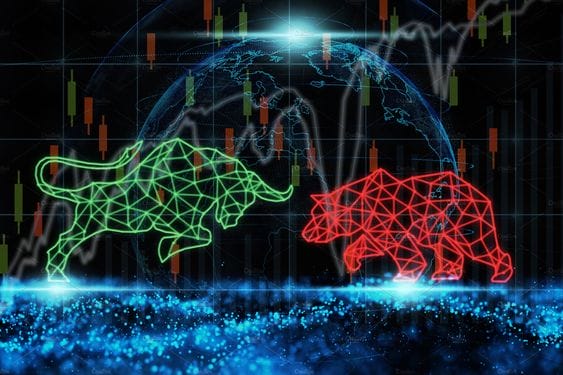Bear market: Market is down
If the bull market describes growth and stability, the bear market represents the inverse: pessimism, loss on investments, and a usually regarded “bad” economy.

I spent way too much time on this meme.
A bear market describes an economic trend in which there is pessimism about the market. Generally, there’s stagnation or a downward trend, people’s confidence in the economy is low, and more people are selling stock than buying. A bear market is also a good indicator of a recession — a long-term period of negative growth.
As such, investors who are pessimistic about market trends are typically described as being “bearish.”
Other key indicators of a bear market:
- Loss of jobs. Low employment rates are typically a sign of a bear market. As companies lose business, this results in layoffs and the loss of work.
- Market prices are falling. Fewer people are willing to buy stock. As a result, prices of shares go down and the market falters.
- More “short” stock trading. This is when investors sell shares they don’t own in order to buy the shares later at a lower price. It’s one way to benefit from a down market. A very bearish move.
Though a bear market seems bad, it doesn’t typically last long. Remember that study from Morningstar? It shows that the average bear market lasts only 1.4 years, while the average cumulative loss from a bear market is 41%.
Also there are several ways investors can benefit from a bear market. One example: would you rather be buying a house when prices are going up or down?
Another: Would you rather invest in the market at its bottom or at its peak?
Notable bear market examples
- The Great Depression. The stock market crash of 1929 kicked off the start of the most famous bear market period: The Great Depression. It didn’t end for years afterward, and during that time millions of Americans lost their jobs, homes, and well-being. It wasn’t just America either. The entire world felt the impacts of America’s bear market.
- The dot-com burst. The years following the dot-com burst of the early-2000s saw a massive dip in the stock market as well as the shuttering of countless tech companies. Household wealth also took a hit of over $6 trillion leading to a recession, according to FiveThirtyEight.
- The housing market crash. Though nearly a decade has passed, the housing market crash of 2008 is still a fresh wound for many people. In its wake, millions of workers lost their jobs, homeowners lost their houses, and consumer spending fell by 8%. Though we’re in a bull market now, we’re still feeling the effects of the crash and its subsequent bear market today.
Bear markets can be scary, but they don’t tend to last very long — though that’s admittedly cold comfort for investors going through one.
The origins of bull vs bear market
Now you know the difference between a bull vs bear market! Congrats! But why the heck are they called that?
Traditionally, it’s believed that the term comes from the way each animal attacks.
A bull, with its squat legs and sharp horns, attacks by swinging its head upwards, like the upward swing of the economy in bull market years. Bulls are also typically lively and ferocious animals, not unlike the optimistic investor.
A bear on the other hand will swat downwards with its paw when it attacks, like the downward trend of a recession. That, coupled with the fact that bears can also be found hibernating for long periods of time, makes it no surprise that “bear” will be used to describe slow market periods.
Others believe that their connection to the stock market can be traced back to the Elizabethan period and ancient Rome. During this time, the two animals were the center of bloody bear- and bull-baiting shows, where the two animals would fight for people’s entertainment. Over time, the association stuck and became associated with the financial sphere.
What do bull vs bear markets mean for YOU?
Simply by doing your research, and looking up terms like “bull vs bear” or “portfolio rebalancing,” you’re already ahead of 99.99% of people out there when it comes to planning for your financial future.
That’s why I want to offer you The Ultimate Guide to Personal Finance.
In it, you’ll learn how to:
- Master your 401k: Take advantage of free money offered to you by your company…and get rich while doing it.
- Manage Roth IRAs: Start saving for retirement in a worthwhile long-term investment account.
- Spend the money you have — guilt-free: By leveraging the systems in this guide, you’ll learn exactly how you’ll be able to save money to spend without the guilt.
Enter your info below and get on your way to living a Rich Life today.

